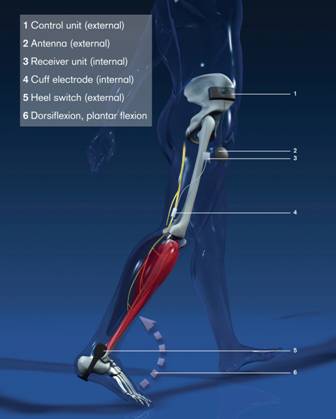ActiGait implanted muscle stimulator improves walking for stroke patients
1 June 2010
Otto Bock Healthcare has launched the ActiGait implant that aids stroke patients suffering from drop foot by electronically stimulating leg-muscles to compensate for the lack of control of the ankle joint.
The ActiGait system restores a steadier and more natural walking pattern to the wearer, meaning users can focus on their outer environment and return to more normal daily activities.
Drop foot is the inability to raise the foot due to a weakness in or paralysis of the dorsiflexor muscles. This condition is a frequent result of damage to the central nervous system following a stroke. ActiGait is implanted beneath the skin of the thigh, with the control unit worn comfortably on a belt and is easy to use, even for patients with impaired arm functionality.
The system is not encumbering as it is wireless with implanted electrodes. This is in contrast to other wired devices that use external electrodes requiring careful positioning on the surface of the leg, a time-consuming and challenging process, often quoted as reasons to cease using these devices.

The ActiGait implant components
ActiGait operates through different components (see image above). Stimulation signals and energy impulses from the control unit are sent through the skin via a lightweight antenna, worn on the thigh to the implanted four channel cuff electrode positioned around the common peroneal nerve, which activates the muscles of the front and lower leg and provides a balanced dorsiflexion. A wireless heel switch, which can be worn either with or without a shoe, registers the lifting and placement of the foot and triggers the stimulation.
Patient studies carried out in Denmark (Journal of Rehabilitation Medicine 40:89-91) illustrated an increase in distance patients could walk in a four-minute period and in walking speed over 20 metres, without the help of another person. Furthermore, qualitative responses highlighted improvement in confidence with less fear of falling, promoting the long-term potential to provide a positive effect on personal well-being, safety and performance.
Dr Salim Ghoussayni, Business Development Manager for Neurostimulation at Otto Bock Healthcare states, “Each year approximately 110,000 people in England alone suffer from a stroke, making it the single most common cause of severe disability. Around 300,000 people are living with moderate to severe disabilities as a result of stroke. Feedback from patient studies in Europe has revealed that ActiGait enables stroke patients to walk longer distances at an increased speed and with improved confidence. As it is implantable, it also offers a more cosmetic and practical user-friendly alternative for individuals who cannot use a surface device due to skin reactions, for example.”